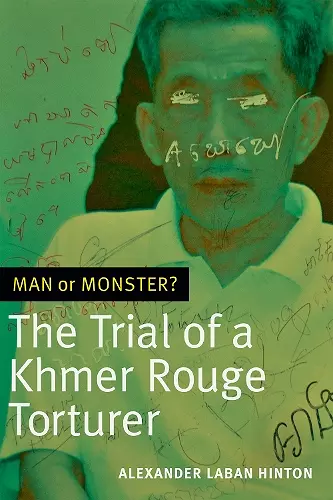Man or Monster?
The Trial of a Khmer Rouge Torturer
Format:Hardback
Publisher:Duke University Press
Published:8th Nov '16
Currently unavailable, and unfortunately no date known when it will be back
This hardback is available in another edition too:
- Paperback£23.99(9780822362739)

During the Khmer Rouge's brutal reign in Cambodia during the mid-to-late 1970s, a former math teacher named Duch served as the commandant of the S-21 security center, where as many as 20,000 victims were interrogated, tortured, and executed. In 2009 Duch stood trial for these crimes against humanity. While the prosecution painted Duch as evil, his defense lawyers claimed he simply followed orders. In Man or Monster? Alexander Hinton uses creative ethnographic writing, extensive fieldwork, hundreds of interviews, and his experience attending Duch's trial to create a nuanced analysis of Duch, the tribunal, the Khmer Rouge, and the after-effects of Cambodia's genocide. Interested in how a person becomes a torturer and executioner as well as the law's ability to grapple with crimes against humanity, Hinton adapts Hannah Arendt's notion of the "banality of evil" to consider how the potential for violence is embedded in the everyday ways people articulate meaning and comprehend the world. Man or Monster? provides novel ways to consider justice, terror, genocide, memory, truth, and humanity.
"Hinton’s book doesn’t just tackle the complexity of a character like Duch through the lens of the trial. It offers a way to understand the court proceedings, which can often be dry, convoluted, and peppered with legalistic jargon." -- Erin Handley * Phnom Penh Post *
"Hinton’s intent is ambitious and unusual; recording is not enough. As he explains in his dense introduction, he wants us to understand this man, this trial and the questions it raises in our very bones. So, contrary to standard academic practice, he presents his material in an astonishing variety of ways. . . . Hinton’s book is profound, insightful and singular, probably even important. Most certainly a boon to anyone interested in Khmer Rouge history, international tribunals, torture or the ambiguities of evil."
-- Antonia D. Bryan * Mekong Review *
"The book draws on various literary genres in compiling a work which is artistic and scholarly, readable yet theoretically grounded, empirically rigorous and engaging yet approachable by people unfamiliar with the case. . . . This book will become standard reading for anyone studying the portrayal of perpetrators during post-conflict justice processes. . . ." -- Timothy Williams * Genocide Studies and Prevention *
"Hinton has written a commendable work offering a new standard in the field of ethnodramatisation linked to the performative realm of an international tribunal where the hybrid nature of the court against the background of a shattered Buddhist society rebuilding from the ashes makes for real spectacle. . . . His book also stands out for its literary and philosophical innovations."
-- Geoffrey C. Gunn * Journal of Contemporary Asia *
"Hinton has written an interesting and insightful book, with a critical look at the way justice shapes and 'redacts' our understanding of the past, and an invitation for its readers to analyze our own way of seeing the world and overcome the simple categorizations we all use in our everyday life, which can have monstrous consequences."
-- Sanne Weber * Historical Dialogues *
"Hinton does the reader a tremendous service by not reducing Duch to a single identity. The book is certainly not a sympathetic take on Duch’s character, but it is a concerted effort to create a multidimensional understanding of a complicated man acting in complicated circumstances.... By using Duch’s trial as a case study, Hinton also addresses the many larger questions of transitional justice." -- Sharon Wu * LSE Review of Books *
"Hinton expertly weaves trial proceedings, testimonials, and contemporary analyses of Democratic Kampuchea, thereby crafting an ambitious exposé of Duch’s trial and the various forces behind collective memory of him.... Man or Monster? is a thought-provoking literary triumph by Hinton" -- Matthew Galway * Journal of International and Global Studies *
"The book, with its chilling but instructive contents, will benefit tremendously Asian experts as well as specialists on pogrom as well as researchers and students interested in the Cambodian story." -- Augustine Adu-Frimpong * African and Asian Studies *
"Alexander Laban Hinton has written a highly engaging and experimental ethnography of international justice that narrates the criminal trial of Kaing Guek Eav (aka 'Duch'), a central figure in the 'killing fields’ of 1970s Cambodia." -- Richard A. Wilson * Anthropology Book Forum *
"Hinton’s 'ethnodrama' of the trial of Duch is largely a chronological account, interspersed with personal commentary and even some poetic interludes that make it anything but a dry academic tome. . . . Man or Monster is unique in its appeal both to students of post-conflict socio-political issues and to the general reader, and is a major contribution to genocide studies."
-- D. Gordon Longmuir * Pacific Affairs *
"The book is a stunning achievement. . . . Hinton succeeds beautifully in drawing the reader into a confrontation with our own articulations and redactions of the world around us." -- Catherine Bolten * American Anthropologist *
“Man or Monster? will be useful to those studying anthropology, geography, international relations, transitional justice and law, genocide, violence, and post-conflict politics. It will also be of use to those considering the very work we do as social scientists; how what we do is intimately involved in the frames of how others come to understand particular places, people, and events.” -- JoAnn DiGeorgio-Lutz * Journal of Southeast Asian Studies *
“Compelling. . . . A highly original account.” -- Rachel Hughes * Law & Society Review *
"Hinton gives a reader unfamiliar with these proceedings a good picture of how they were conceived, how they have unfolded, and how civil society in Cambodia has interacted with them.” -- John Quigley * Human Rights Quarterly *
ISBN: 9780822362586
Dimensions: unknown
Weight: 612g
360 pages